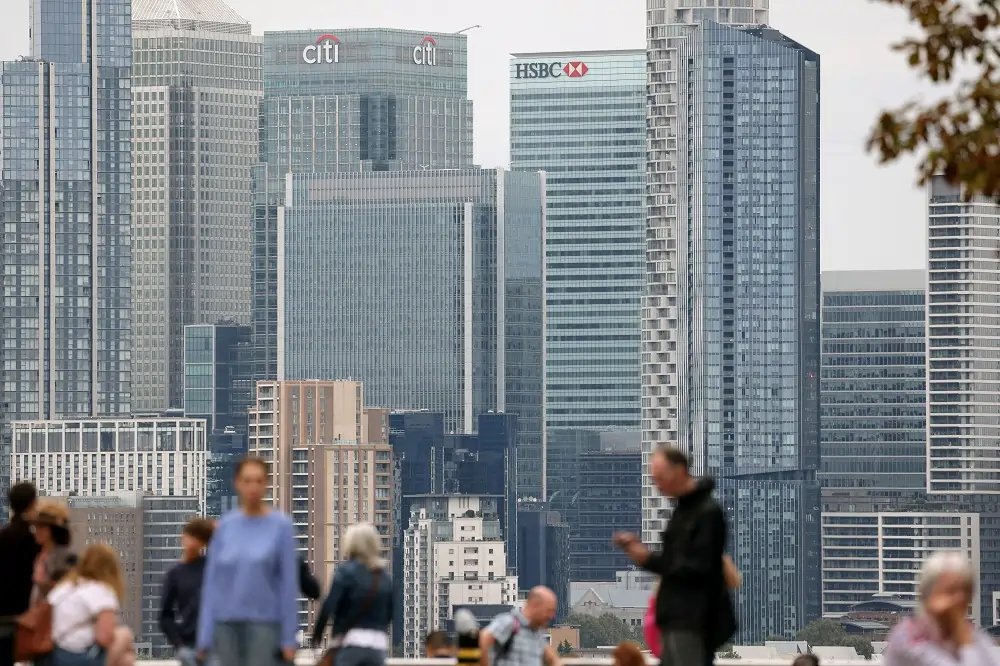UK economy returns to growth in August after two months of stagnation
Published by Jessica Weisman-Pitts
Posted on October 11, 2024
3 min readLast updated: January 29, 2026

Published by Jessica Weisman-Pitts
Posted on October 11, 2024
3 min readLast updated: January 29, 2026

By Suban Abdulla and Andy Bruce
LONDON (Reuters) -Britain’s economy grew in August after two consecutive months of stagnation, providing some relief to finance minister Rachel Reeves ahead of the new Labour government’s first budget later this month.
Economic output rose by 0.2% in monthly terms in August, according to figures from the Office for National Statistics that were in line with expectations in a Reuters poll of economists.
“This will provide a timely boost for the chancellor amidst a backdrop of growing spending pressures,” said Yael Selfin, chief economist at KPMG UK.
Reeves welcomed the news on Friday and said that economic growth was a top priority for the government.
All major sectors showed growth in August, the statistics office said, but weaker-than-expected growth in the dominant services sector was offset by a strong rebound in manufacturing and construction.
It left unrevised its estimates for monthly gross domestic output for July and June, when the economy stagnated, but revised down its estimates for April and May to -0.1% and +0.2% respectively, compared with previous estimates of 0.0% and +0.4%.
Sterling was little changed after the figures were released, with investors continuing to bet on a quarter-point rate cut by the Bank of England in November.
Compared to a year ago, economic output was 1.0% higher, below the 1.4% growth forecast by economists, a miss that reflected the downward revisions to previous months.
TURNING A CORNER?
Britain’s economy now looks on track to grow in the second half of the year, albeit at a slower rate than in the first quarter.
Last month the Bank of England said it expected economic growth to slow to 0.3% in the third quarter, and a similar rate of growth in the final three months of 2024.
The central bank is expected to cut borrowing costs at its Nov. 7 meeting after its first cut in more than four years in August and a pause in September.
“The big question mark is the government’s vision for the economy,” said Barret Kupelian, chief economist at PwC.
For economic growth to continue on a sustained basis, businesses, households and foreign investors require certainty to make choices and investment decisions.
Prime Minister Keir Starmer will host an international investment summit on Oct. 14, aimed at boosting foreign direct investment to help improve economic growth – one of his main missions since coming to power in July.
Starmer said he was aiming for annual economic growth of 2.5% when campaigning in the run-up to the election – a rate Britain has not regularly reached since before the 2008 financial crash.
Britain’s economy has been slower to recover from the COVID-19 pandemic than many of its Group of Seven peers, but the statistics office said the economy was 3.4% larger in August than it was in February 2020, before the crisis.
(Reporting by Suban Abdulla and Andy Bruce; editing by William James, Toby Chopra and Christina Fincher)
Economic growth refers to an increase in the production of goods and services in an economy over time, typically measured as the percentage increase in real GDP.
Monetary policy involves the management of a country's money supply and interest rates by its central bank to control inflation and stabilize the currency.
The financial community includes institutions, professionals, and individuals engaged in financial services, investment, and economic activities.
Explore more articles in the Business category











